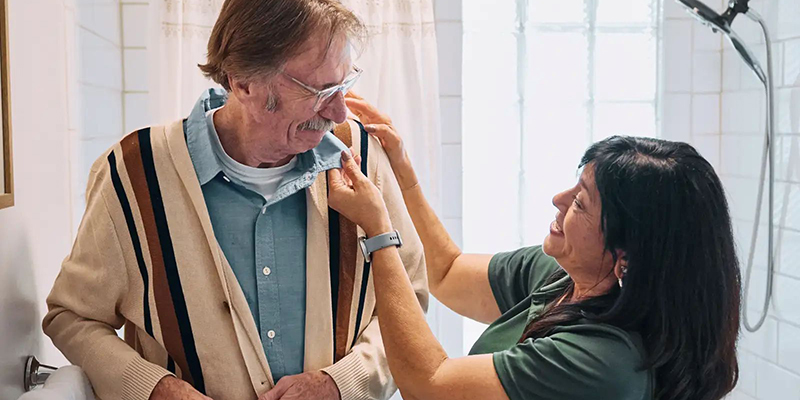When my mom turned 78, my siblings and I noticed slight changes. She forgot to water her plants, struggled to climb stairs, and often felt lonely after my dad passed. We knew she needed support but didn't want to take away her independence. That's when we began researching senior living options—and realized how confusing the choices can be. If you're in the same boat, you're not alone. Let's break down the differences between assisted and independent living to help you make the best decision for your family.
When my mom turned 78, my siblings and I noticed slight changes. She forgot to water her plants, struggled to climb stairs, and often felt lonely after my dad passed. We knew she needed support but didn't want to take away her independence. That's when we began researching senior living options—and realized how confusing the choices can be. If you're in the same boat, you're not alone. Let's break down the differences between assisted and independent living to help you make the best decision for your family.
What Is Assisted Living?
Assisted living is like having a helpful roommate who's always there when you need them. It's designed for seniors who need help with daily tasks but don't require round-the-clock medical care. Think of it as a middle ground between living at home alone and moving into a nursing home.

In assisted living, staff can help with bathing, dressing, taking medications, and managing chronic conditions. Meals are often provided, and there's 24/7 support if something goes wrong. Many communities also offer activities like exercise classes, game nights, or trips to local museums.
Why Choose it?
You get personalized care tailored to your needs.
Safety is a priority, with emergency call systems and staff nearby.
Meals, housekeeping, and laundry are handled for you.
Social opportunities reduce loneliness.
The Downsides?
It can be expensive, depending on the level of care.
Rules about guests or pets might feel restrictive.
Moving from a longtime home can be emotionally challenging.
What Is Independent Living?
Independent living is for seniors who can handle daily tasks but want to simplify their lives. Imagine a condo complex or apartment building where everyone is over 55. You keep your freedom but don't have to worry about home maintenance, yard work, or cooking every meal.
These communities often include amenities like gyms, pools, clubhouses, and scheduled social events. You might share a meal in the dining hall one night, join a book club the next day, or take a bus trip to a local attraction. The focus is on staying active and connected.
Why Choose it?
You maintain control over your daily routine.
No more mowing lawns, fixing leaks, or shovelling snow.
You'll meet neighbours who share your life stage.
Costs are often lower than assisted living.
The Downsides?
Limited medical support—if you need help bathing or taking pills, this isn’t the right fit.
You're responsible for your meals and medications unless you pay for extra services.
If your health declines, you might need to move again.
Key Differences Between Assisted and Independent Living
1. Level of Care
Assisted living includes hands-on help with daily activities. This is the better option if you need reminders to take medication, assistance with bathing, or someone to check on you at night. Independent living assumes you can manage these tasks alone.
2. Daily Life
In independent living, you set your schedule. Want to sleep in, cook breakfast, or spend the day gardening? Go for it. Assisted living adds structure—meals are served at set times, and staff may help you plan your day.
3. Cost
Independent living is usually cheaper because there’s no built-in medical care. Assisted living costs more due to staffing and services. On average, assisted living can cost $4,000–$6,000 per month, while independent living ranges from $2,000–$4,000.
4. Social Opportunities
Both options offer social activities but assisted living often has more organized programs to keep residents engaged. Independent living leans on community-driven events, like potlucks or volunteer groups.
When Should You Choose Assisted Living?
My neighbour, Mrs Ellis, moved into assisted living after a fall left her with a broken hip. Her kids worried she'd lose her spark, but she blossomed. The staff helped her regain strength through physical therapy, and she made friends in the art class they offered. Assisted living is ideal if:
You need help with tasks like dressing, cooking, or medication.
You’re recovering from an injury or illness.
You want peace of mind knowing help is always nearby.
When Should You Choose Independent Living?
My uncle Joe chose independent living after retiring. He traded his sprawling house for a cosy apartment with a pool and golf course access. He jokes that he's busier now than when he worked! Independent living works best if:
You’re active and can manage daily tasks without help.
You crave fewer chores and more time for hobbies.
You want to build a community with people your age.

How to Decide: 3 Questions to Ask
1. What does your loved one need right now?
If they forget meals or struggle to walk, assisted living provides safety. Independent living offers freedom if they're healthy but tired of home upkeep.
2. What about the future?
Assisted living communities often have tiered care, which can adjust as needs change. If health declines, moving to independent living might be necessary.
3. Have you visited communities?
Tour both options. Notice if the staff seems kind, the residents look happy, and the space feels welcoming. Bring your loved one along—they'll know if it feels like home.
Making the Transition Easier
Moving is hard at any age. When my mom decided on assisted living, we made it a team effort. We decorated her room with family photos, let her pick the paint colour, and celebrated her first week with a pizza party. Small gestures matter.
If your loved one resists the idea, listen to their fears. Reassuring them is not about losing independence but about gaining security, friendship, and joy.
Talking to Family About the Next Steps
I’ll never forget the night we sat down with Mom. We listed pros and cons, shared stories from friends who’d made the move, and promised to visit often. It wasn’t easy, but honesty helped.
If your family disagrees, focus on facts. Share costs, care options, and how each choice aligns with your loved one’s values. Sometimes, a neutral third party—like a geriatric care manager—can mediate.
Finding the Right Fit
Start by asking friends or your doctor for recommendations. Check online reviews, but visit in person to get a feel for the place. Ask about staff turnover, meal quality, and how they handle emergencies.
Remember: This isn’t a permanent decision. If something isn’t working, you can reassess. The goal is to ensure your loved one feels safe, valued, and happy.
Next Steps for Your Family
Choosing between assisted and independent living isn't about labelling someone as "needy" or "independent." It's about honouring their needs while giving them the best quality of life. Start the conversation early, involve your loved one in every step, and trust that you're doing what's best for their health and happiness.
- Share this article:
-
![Exploring The Streets Of Paris: A Travel Guide]() Travel
Travel - Exploring The Streets Of Paris: A Travel GuideHave you ever wished to walk through Paris' beautiful streets while sitting at a traditional café, drinking coffee, and admiring the Eiffel Tower against the night sky? Travellers worldwide fall in love with "The City of Light," i.e. Paris. Paris presents so many attractions that it becomes challenging to decide where to begin.
-
![Top 10 Home Decor Trends of 2025 You Need to Try]() Home & Garden
Home & Garden - Top 10 Home Decor Trends of 2025 You Need to TryHave you ever entered a place that immediately felt organized, stylish and comfortably warm? Would you like to create a modern, fresh and welcoming feel at your home? The year 2025 brings new home decor trends which combine trendy design with lasting elegance for your living space. There are so many designs in trend during 2025, and you will find your best. Let's discuss some ideas to make your fresh and appealing.









